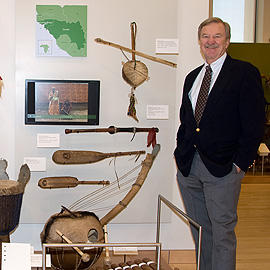
By: Eli Freund, Editorial Communications Manager, UConn School of Engineering
Lyman Orchards, a fixture in Connecticut, has graced the tables of families with produce and baked goods for hundreds of years. But with growing popularity among consumers, and increased retail partnerships, Lyman finds themselves at the upper limits of their production capacity—and is calling on a group of UConn Engineering students to use their expertise to find creative solutions.
“What we’re looking for are process improvements. Currently, Lyman has a small production space, and they’re looking to move into a bigger space, but until then, with the space they have now, they can’t meet the high demand for their products. So, the overall goal is to increase their pie production by 30 percent to 50 percent in their current facility,” said Management and Engineering for Manufacturing student Lindsey Fleck
Founded in 1741, Lyman Orchards, located in Middlefield, Connecticut, covers 1,110 acres, and features “pick your own” fruits, a restaurant, 36 holes of championship golf, a 9-hole course, one of the top golf training facilities in the state, event space, a farm market and a bustling bakery business, creating pies that sell directly to consumers, as well as several supermarket chains.
This year, Lyman Orchards and their CEO Gary Jalbert connected with MEM students Fleck, Allison Pfahler, Scott Gaffney, and Blanche Gorham to closely observe the manufacturing process and make some fresh recommendations. To do that, the team has been doing some safe and socially distanced observing at the production facility, timing every part of the process.
“During the Fall semester, we’ve been going to Lyman once a week and doing time studies, making sure to time each of their processes, determining the optimal speed and identifying bottlenecks. Eventually we’re hoping to create a model that they can implement to help reach their goal,” Gaffney said.
But during this socially distanced school year, while some groups are finding it hard to get things done, this group of four is tackling every challenge that comes their way.
“One obstacle is that our schedules don’t overlap easily. We have been going to Lyman once a week, with this being their busiest season, and it’s been hard to find a common time to get down there. Luckily, with all of our other work, and when talking with our sponsor, we’ve been able to have virtual meetings, which make things much easier,” Pfahler said.
Plus, the familiarity with each other has made the team work very well.
“We’ve known of each other through MEM classes, but also Allie and Blanche were roommates last year, and Lindsey and I are cousins. So, you could say we all know each other pretty well,” Gaffney said.
The team said that once they’re done with the time studies, they’ll start to work over winter break to break into the second phase of their project—the recommendations.
“After our time studies are completed, we’re going into the next step, which is to analyze the time studies and look for places of improvement. We’re also going to look into increased freezing methods, because with increased production output comes the challenge of how to freeze it before shipping to their customers,” Gorham said.
All in all, every student in this group is excited to help an established, local business, especially one that has been a staple in most of their homes growing up.
“My grandparents live so close to Lyman Orchards and they ask me every time I mention it about my memories there. I grew up eating their pies, getting lost in their corn maze and picking their apples. It’s a big part of my childhood,” Pfahler said.
This article is part of a multi-part series on engineering students, and their journey through senior design. Part two of this team’s journey will come out in April 2021.



